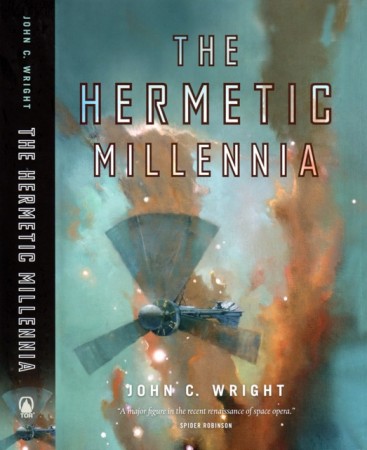Interview with Liberty Voice
Douglas Cobb of Liberty Voice does me the honor of interviewing me, asking me about my Count to the Eschaton Sequence.
Read the whole thing here: http://guardianlv.com/2014/03/john-c-wright-on-the-judge-of-ages-and-more-interview/
The basic inspiration for the story came, oddly enough, from fans of my previous series, THE GOLDEN AGE. It seems there is a certain club or cult of folks, called Transhumanists, who take science fiction more seriously than I do, and they believe that the various marvels I predicted in that book, such as the ability to record human brain information, copy it, edit it, and download it into bodies much more durable than flesh and blood, are all to be discovered within the lifetime of men now living. In several conversations I tried to point out that the main problem was a moral one, not a technological one, although the technological problems themselves are insurmountable. (We do not even, for example, have a precise scientific definition of human thought, nor any way to reduce it to measurement).
As the conversation progressed the transhumanists (or at least those with whom I spoke) began making ever more astonishing and even absurd claims. An astonishing one was that any superior intelligence created by humans should not be educated according to any human moral standard, but allowed by trial and error to fall into any sort of moral philosophy it saw fit. This was based on an unspoken assumption that humans were so wicked that anything we tried to teach, even something as simple as the Golden Rule, would corrupt the pristine perfection of the Frankenstein’s Monster. An absurd claim was that entropy itself could someday be reversed. At this point I realized I was not dealing a scientific speculation, but cultic emotionalism.
Fairness requires I emphasize that not every man calling himself a Transhumanist buys into those last two ideas. For all I know, only the man who said it believes it, and, as time passes, maybe not even him. But it pointed out to me the easy way a man who idolizes intellect over moral sentiments, a man who prizes genius over saintliness, will easily be tempted to make an artificial intellect an idol, complete with human sacrifice.
It was the contemplation of the difficulties and drawbacks of discovering some method for superbeings and human beings to cooperate harmoniously which led to the central idea of COUNT TO A TRILLION, which is a meditation on the sheer scale and magnitude of the problems an interstellar polity would face, even if manned by immortal computer brains the size of Jupiter.
The second inspiration came from the majestic, if deeply flawed, works of Olaf Stabledon, particularly STAR MAKER. Mr Stabledon tells a story reaching from before the formation of the galaxies to the end of the universe with glimpses of what is beyond. But, for all his genius, he tells it wrongly, proposing that universes, like amoeba, are created by a blind and cruel demiurge, a godlike being who has no love for his creations, and who is engaged in experimentation for the sake of discovering ever higher states of evolution. Evolution, in that sense, means a blind and vicious process or trial and error where error means death. This is not the way civilizations progress, nor can civilizations be said to ‘evolve’ except by using a metaphor quite opposite its true meaning.
The third inspiration came from the Drake Equation Paradox, which asks, if life arises naturally, and civilization inevitably reaches toward the stars, where are all the aliens? Even we assume life is very rare, given the sheer number of stars in the sky, the galaxy should be overcrowded. My answer is one I frankly have not seen elsewhere in any other science fiction book.
The fourth inspiration came from the contemplation of the problem of Buck Rogers. If you recall, he was trapped in a mine cave in, and exposed to a radioactive gas which allowed him to sleep, as unaging as Rip van Winkle, until the Twenty Fifth Century. If you meant to pass your time in cryonic sleep, whom could you trust to watch the slumbering coffin? Would you wake up destitute, a beggar, hoping your children of the future would pay for your recuperation and education? Why would they?
Could you store gold or other valuables in the coffin? If so, how to avoid grave robbers?
No bank, no government, has a record of lasting more than a few decades, or a few centuries at most. The Roman Catholic Church, perhaps, could be trusted to guard sleeping bodies, sleeping on their gold, but not if mankind changed into something else, not once but many times, as centuries turned into millennia.
The graveyard guards themselves would have to be independent of any government, any institution, and live at a pace quicker than their charges (so as to fend off looters) but slower than the current world (so as to live long enough to guard the slumberers beyond the span of normal human lives). But they would have to be so vicious, that the legend of the vengeance of anyone who disturbed the slumbering dead would last a thousand years. And the legends would grow…
And so my next inspiration, oddly enough, come from those old movies about mummies, where rash British archeologists ignore the warnings of shivering native boys and dig up some ancient necromancer-king (who always seems to think the archeologist’s beautiful daughter is the reincarnation of his queen).

